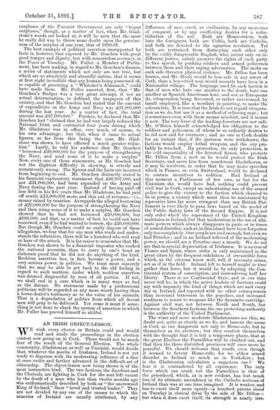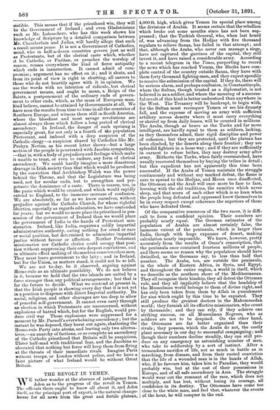AN IRISH OBJECT-LESSON.
WE wish every elector in Britain could and would read and study the proceedings in the election contest now going on in Cork. There would not be much fear of the result of the General Election. The whole community, Gladstonian as well as Unionist, would decide that, whatever the merits of Irishmen, Ireland is not yet ready to dispense with the moderating influence of a race at once cooler and farther advanced in the difficult art of citizenship. The object-lesson now being shown is of the most instructive kind. The two factions, the Jacobins and the Clericals, are fighting in Cork for the seat left vacant by the death of a man who less than twelve months ago was enthusiastically described by both as "the uncrowned King of Ireland," their " loved and trusted leader." They are not divided by any one of the causes to which the miseries of Ireland are usually attributed, by any difference of race, creed, or civilisation, by any memories of conquest, or by any conflicting desires for a redis- tribution of the soil. Both are Home-rulers, both hate the foreigners, both are Celtic, both are Catholic, and both are devoted to the agrarian revolution. Yet both are restrained from destroying each other only by the coldly disagreeable English, who, intent only on in- different justice, calmly preserve the rights of each party to free speech, by pushing soldiers and armed policemen between them and their raging adversaries. The mobs on each side threaten physical violence. Mr. Dillon has been beaten, and Mr. Healy would be less safe in any street of Cork, than a boycotted man would recently have been in a Nationalist village. The language used by each faction is that of men who hate one another to the death, hate one another as Spanish Americans hate, and not as Europeans do, vituperation being flavoured, or rather envenomed, by insult employed, like a mordant in painting, to make the colours bite. It is true that the Irish do not regard vitupera- tion as we do, but use it as a method of relieving rage ; but it sometimes even with them means mischief, and it means it now. The very lives of the leading deserters are not safe. Mr. O'Brien himself acknowledged his obligation to the soldiers and policemen, of whom he so ardently desires to be rid now and for evermore ; and no one in Cork doubts for an instant that, if the garrison were withdrawn, the factions would employ lethal weapons, and the city pro- bably be wrecked. Its protection, its only protection, is the cold impartiality of the detested Saxon, who protects Mr. Dillon from a mob as he would protect the Irish Secretary, and saves him from murderous blackthorns, or it may be revolvers, in order that he may make speeches which in France, or even Switzerland, would be declared to contain incentives to sedition. Had Ireland at this moment a Parliament of her own, as but for the Unionists she would have had, nothing could prevent civil war in Cork, except an unhesitating use of the armed police to give the victory to the faction which chanced to be in power, a victory which must then be maintained by repressive laws far more stringent than any British Par- liament is ever likely to pass, laws based on the model of the Public Safety laws of the Second Empire. It is not only order which the supremacy of the United Kingdom maintains in Ireland, but that moderation in the use of ulti- mate powers which always disappears in panic or in times of armed disorder, such as in this island have been forgotten only too completely. Our people are cool enough, but even we had Peterloo ; and in an Ireland relieved of the moderating power, we should see a Peterloo once a month. We do not say that in special depreciation of Irishmen. It is as true of France and Spain, where order is only maintained in the great cities by the frequent exhibition of irresistible force which, as the citizens know well, will, if necessity arises, act as if in the field. Ireland left to herself might in time gather that force, but it would be by adopting the Con- tinental system of conscription, and surrendering half her liberty. There is no Continental State, and in our time never will be, in which the active leaders of factions could say with impunity the kind of things which are said every day in Ireland, and reported with no other consequences than increased bitterness in the populace, and increased readiness to resort to weapons like the dynamite-cartridge. Against civil war, not between North and South, but between the Southern factions, the one protecting authority is the authority of the United Parliament. The wiser and more moderate Gladstonians see this, we doubt not, quite as clearly as we do, and lament the scene in Cork as one dangerous not only to Home-rule, but to themselves as its abettors ; but they comfort themselves with the thought that it is but a temporary phase, that at the great Election the Parnellites will be crushed out, and that then the three disturbed provinces will once more be peaceful. We should welcome that result, even though it seemed to favour Home-rule, for we abhor armed disorder in Ireland as much as in Yorkshire ; but is the Gladstonian calculation a sagacious one ? We fear it is contradicted by all experience. The only force which can crush out the Parnellites is that of the priesthood, which, as is now evident, has lost much less of its ultimate ascendency in the Catholic sections of Ireland than was at one time imagined. It is weaker, and has to exert itself more openly—a hundred priests stood on Tuesday in clerical dress by the side of Mr. Dillon— but when it does exert itself, its strength is nearly irre- aistible. This means that if the priesthood win, they will be the Government of Ireland ; and even Gladstouians such as Mr. Labouchere, who has this week shown his knowledge of Scripture by a detailed comparison between Mr. Chamberlain and Judas, will hardly allege that such a result means peace. It is not a Government of Catholics, mind, who in half-a-dozen countries govern just as well as Protestants, but of the clerical caste which, whether it be Catholic, or Puritan, or preaches the worship of reason, rouses everywhere the kind of fierce antipathy which ends in insurrection. It cannot admit of com- promise; argument has no effect on it ; and it shuts, and from its point of view is right in shutting, all careers to those who do not heartily agree with it in opinion. We use the words with no intention of ridicule, but clerical government means, and ought to mean, a Reign of the Saints, a postponement of the ordinary ends of govern- ment to other ends, which, as the mass of European man- kind believe, cannot be attained by Governments at all. We have seen the results from time to time iu all the countries of Southern Europe, and witness them still in South America, where the bloodiest and most savage revolutions are almost always those which follow a long period of clerical ascendency. In Ireland, the danger of such uprising is especially great, for not only is a fourth of the population Protestant, and imbued with a deep suspicion of the Catholic clergy—a suspicion shared by Catholics like Mr. Probyn Nevins, as his recent letter shows—but a large section of the people is penetrated with Jacobin sympathies, —that is, with a body of prejudices and feelings which make it unable to trust, or even to endure, any form of clerical ascendency. We could hardly imagine a more disastrous cleavage in Irish society than that which would be produced by the conviction that Archbishop Walsh was the power behind the Throne, and that the Legislature was being used, not for secular ends, but to strengthen and per- petuate the dominance of a caste. There is reason, too, in the panic which would be created, and which would rapidly extend to England, to the immense increase of confusion. We are absolutely, so far as we know ourselves, without prejudice against the Catholic Church, for whose rightful liberties, especially as regards education, we have contended for years ; but we would no more place its priesthood in pos- session of the government of Ireland than we would place the government of India in the hands of Protestant mis- sionaries. Ireland, like India, requires a coldly impartial administrative authority, caring nothing for creed or race or social position, but determined to administer impartial justice without favour or affection. Neither Protestant missionaries nor Catholic clerics could occupy that posi- tion without suppressing their own deepest convictions, and iu ultimate effect making of themselves conscienceless men. They must leave government to the laity ; and in Ireland, but for the Union, as matters stand, it could not be so left.
We are not to-day, be it observed, arguing against Home-rule as an ultimate possibility. We do not believe in it, because we hold that the two islands are united by a force stronger than any political arrangements ; but that is for the future to decide. What we contend at present is, that the Irish people is showing every day that it is not yet in a position to dispense with direct Imperial authority. Its social, religious, and other cleavages are too deep to allow of peaceful self-government. It cannot even carry through an election in which Protestants are unconcerned, without explosions of hatred which, but for the English, would pro- duce civil war Those explosions were suppressed for a moment by Mr. Parnell's overwhelming ascendency ; but the instant he was deposed, they burst out again, shattering the Home-rule Party into atoms, and leaving only two alterna- tives,—an anarchy of factions, or so complete an ascendency of the Catholic priesthood that Britain will be suspicious, Ulster half-mad with traditional fear, and the Jacobins so ulcerated that nothing but force will keep them from flying at the throats of their immediate rivals. Imagine Paris without troops, or London without police, and we have a faint picture of what Ireland would be without Great Britain.



































 Previous page
Previous page